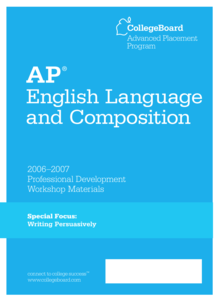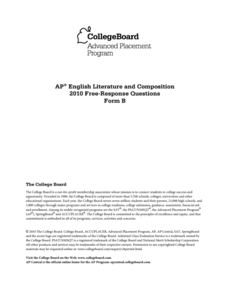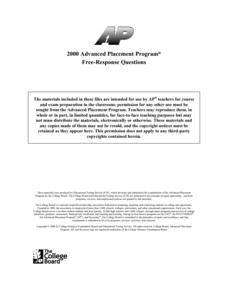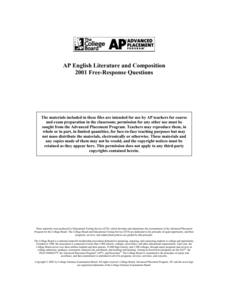College Board
2008 AP® English Literature and Composition Free-Response Questions Form B
Ever wondered what your dog is thinking? Scholars take a close look at two poems written through the eyes of animals and then create essays analyzing each author's technique. Pupils also read a passage to write about the literary...
College Board
AP® English Language and Composition Special Focus: Writing Persuasively
It's not always easy to persuade others. However, it may even be harder to teach others how to be persuasive. Educators get personal insight from Brent Staples, an influential commentator, as well as gain ideas and activities on teaching...
College Board
AP® English Language and Composition: Using Documentary Film as an Introduction to Rhetoric
Rhetoric is the key to character. Scholars work through four activities using documentary films to complete rhetoric analysis. Learners participate in writing a note to a friend and then analyze their own writing. They also view clips...
College Board
2009 AP® English Literature and Composition Free-Response Questions Form B
Do you have a political agenda? Some authors do. Scholars analyze a piece of work and determine how the author deals with a political or social issue. Responding to two other essay questions, writers create essays exploring how authors...
College Board
2010 AP® English Literature and Composition Free-Response Questions Form B
Home is where the heart is. The 2010 AP® English Literature and Composition Free-Response Questions Form B require scholars to think about what home really is. They look at how a character leaves home, yet home remains within the...
College Board
2011 AP® English Literature and Composition Free-Response Questions Form B
It's all in the technique. Authors use many techniques to express themselves using writing. Two of the three essay questions require scholars to analyze the literary devices used by the authors and write essays about how these...
College Board
1999 AP® English Literature and Composition Free-Response Questions
Have you ever felt like you are pulled into two directions? Some authors depict this feeling in their characters. Scholars choose a play or novel in which a character is pulled or influenced by two different directions and write essays...
College Board
2000 AP® English Literature and Composition Free-Response Questions
Everyone enjoys a good mystery. Learners create essays explaining how a mystery gives meaning to a novel or play of their choice. They also examine the use of literary elements of diary entries in The Spectator. A third essay question...
College Board
2001 AP® English Literature and Composition Free-Response Questions
Do 100 years make a difference? Scholars compare two poems written 100 years apart. They also analyze characterization used in a passage from Tom Jones by Henry Fielding. A final essay question allows writers to choose a piece of...
College Board
2002 AP® English Literature and Composition Free-Response Questions
Good or evil? Some characters never identify themselves as either. Scholars create essays in which they examine morally ambiguous characters. Writers also analyze and write essays about the use of poem titles and take a close look at the...
College Board
2002 AP® English Literature and Composition Free-Response Questions Form B
Is there a secret to keeping secrets? Scholars choose a character in a novel or play and analyze how the character keeps a secret. Writers also craft essays to reveal elements of poetry and the use of language in a passage. The...
College Board
2003 AP® English Literature and Composition Free-Response Questions Form B
Ever felt stuck in the middle? Some characters do. Scholars choose a novel or play and write essays describing how a character is stuck between cultures. Writers also analyze the techniques used in a passage from We Were the Mulvaneys...
College Board
2003 AP® English Literature and Composition Free-Response Questions
The released 2003 AP® exam asks scholars to read and respond to two poems about the love god Eros. They also analyze the characterization and narrative in The Other Paris. A final essay question requires pupils to choose a novel or play...
College Board
2004 AP® English Literature and Composition Free-Response Questions
Have you ever felt left in the dark? Scholars write essays after analyzing two poems pertaining to night and darkness. Pupils also read a passage and write an essay discussing the author's depiction of characters. A third essay allows...
College Board
2005 AP® English Literature and Composition Free-Response Questions
Santa is not the only one in the chimney! Scholars compare two poems written about using children as chimney sweepers. They also create essays about literary devices in a passage and about a character's struggle with inward and outward...
College Board
2006 AP® English Literature and Composition Free-Response Questions
Scholars select a novel or play and then craft an essay that describes the setting's role in the story. Pupils also create essays that analyze a poet's use of language and the values of characters in a novel excerpt.
College Board
2007 AP® English Literature and Composition Free-Response Questions
Scholars use the 2007 AP® English Literature and Composition Free-Response Questions to write essays examining how a character's tie to the past affects the story. The resource also requires pupils to write essays comparing two related...
College Board
2008 AP® English Literature and Composition Free-Response Questions
Scholars are challenged to create essays comparing two poems in which the authors discuss fears and concerns about dying and life passing by too quickly. Two other essay questions ask writers to analyze literary elements and characters...
College Board
2010 AP® English Literature and Composition Free-Response Questions
Three free-response prompts provide scholars an opportunity to practice for the AP® English Literature Composition exam. Using released prompts from the 2010 free-response section, writers craft an essay about the experiences of a...
College Board
2011 AP® English Literature and Composition Free-Response Questions
A packet of materials from the 2011 AP® exam provides scholars with an opportunity to examine scored sample essays for the three free-response questions. Included are the prompts, the rubric, scoring guides and sample papers.
College Board
2008 AP® English Language and Composition Free-Response Questions
Are your high school scholars ready for college?
Administering the 2008 AP® English Language and Composition Free-Response
Questions tells much about a
pupil's readiness for high level English courses. The resource offers three
questions...
College Board
2003 AP® English Language and Composition Free-Response Questions
How does perspective change a person's view? Scholars view different perspectives as they compare the styles of two different authors describing a flock of birds. Writers also create essays in response to entertainment ruining society...
College Board
2002 AP® English Language and Composition Free-Response Questions
It is not what you say but how you say it. Scholars use an essay prompt from the 2002 AP® English Language and Composition Free-Response Questions to analyze how an author uses language to describe her past. They also support or argue a...
College Board
2000 AP® English Language and Composition Free-Response Questions
No one is perfect. George Orwell argues imperfection is preferred over sainthood. Scholars write essays describing how he expresses his argument in writing. Writers also respond to Eudora Welty's recollection of life experiences with...

























